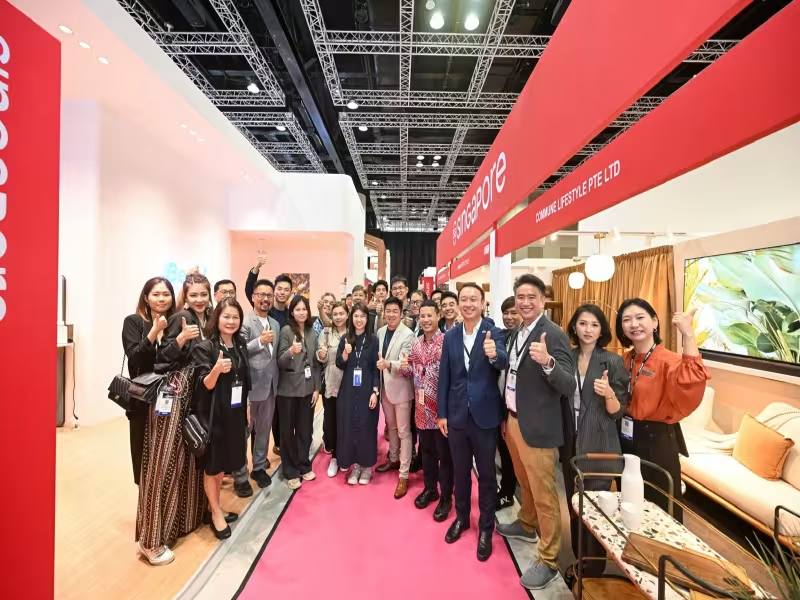
SHERIDAN, WYOMING – July 4, 2024 – Leading the charge in sustainable design, Singapore's furniture industry made a significant impact at Archidex Malaysia 2024. The Singapore Pavilion, organized by the Singapore Furniture Industries Council (SFIC) with support from Enterprise Singapore, served as a showcase for 18 innovative companies committed to green solutions for urban living.
A Showcase of Eco-Innovation
The exhibition, which ran from July 3-6, highlighted a range of sustainable furniture solutions that addressed key environmental concerns. Participating companies demonstrated their commitment to responsible manufacturing through the use of renewable materials, resource-efficient processes, and forward-thinking design.
Notable highlights included:
- Sustainable Materials: Calvary Carpentry's Ez Rail Removable Decking System utilizes Accoya, a sustainable wood chosen for its extended lifespan and easier maintenance, reducing the need for frequent replacements and disposal of older decking materials. Commune Lifestyle prioritizes eco-conscious furniture made from premium, sustainably sourced wood and timber from the USA, Europe, and Southeast Asia. Their focus is on creating furniture that fosters meaningful experiences while minimizing environmental impact, carefully considering the environmental footprint of their materials throughout the entire supply chain.
- Resource Efficiency: Wallhub's Bambos Wall Panels offer a versatile and eco-friendly alternative to traditional wood paneling. Made from fast-growing bamboo, a renewable resource, Bambos Wall Panels provide a beautiful and sustainable way to add warmth and texture to any space. Admira's Artistic Panel on Demand (APOD) is a revolutionary solution for personalized and sustainable design. APOD eliminates minimum order quantities and size restrictions, reducing material waste and the environmental impact associated with excess production. This allows for more efficient use of materials and reduces overall production waste.
- Low-Maintenance Greenery: Vertical Green's HyGroPreserve collection extends the lifespan of natural elements through preserved moss and foliage, catering to the demand for low-maintenance urban greenery. These preserved plants offer the aesthetic benefits of real plants without the need for watering, fertilizing, or pruning, significantly reducing the environmental impact associated with maintaining live plants indoors.
- Design for Disassembly: EDL's Module wall cladding materials create a modular and adaptable wall system, minimizing the need for future renovations or replacements. This extends the lifespan of the materials and reduces construction waste. By designing furniture that can be easily disassembled and reassembled, EDL minimizes waste generation and allows for greater flexibility in adapting furniture to meet changing needs.
Singapore's Green Plan 2030
Mr. Phua Boon Huat, SFIC President and Chairman of SFIC's Sustainability Taskforce, emphasized the council's active role in encouraging sustainable practices: "Our role goes beyond simply showcasing innovative products; it is about empowering Singaporean companies to become market leaders in this critical area."
This commitment aligns with one of the key pillars of Singapore's Green Plan 2030: "Green Growth." The plan seeks to transform industries by harnessing sustainability as a competitive advantage, driving innovation and economic growth.
Upcoming Initiatives: Sustainability Mark and Summit
To further strengthen Singapore's position as a global leader in sustainable urban living, SFIC has two major initiatives planned for later this year: the SFIC Sustainability Mark, which will recognize companies demonstrating excellence in sustainable practices, and the 2nd Sustainability Summit, a platform for industry leaders to collaborate and chart the future of sustainable design.
A Vision for the Future
Singapore's furniture industry is not just adapting to the global sustainability movement; it's actively shaping it. Through innovative products, responsible practices, and forward-thinking initiatives, the industry is setting a high standard for the rest of the world to follow. By prioritizing sustainable design principles and materials, Singaporean furniture companies are not only reducing their environmental impact, but also creating healthier and more livable spaces for future generations. This commitment to sustainability extends beyond the production process. The Singapore Furniture Industries Council (SFIC) is also working to educate consumers about the importance of sustainable furniture choices and to promote a circular economy within the industry. By encouraging consumers to choose furniture made from recycled or renewable materials, and by designing furniture that can be easily repaired, reused, or recycled at the end of its lifespan, the SFIC is helping to create a more sustainable future for the furniture industry as a whole.
About the Singapore Furniture Industries Council (SFIC)
The SFIC is the official representative body of Singapore's furniture and furnishings industry, with a membership of over 330 companies. It is committed to fostering innovation, internationalization, and sustainable development within the industry.
For further information please visit: www.singaporefurniture.com